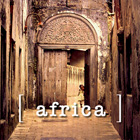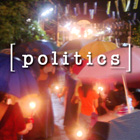
|
|||||||
Photo credit for "Africa" graphic, above: © 2005 Jennifer Lewis
|
DARFUR AGAIN VERGES ON MASS KILLING, MILLIONS IN PERIL
SUDAN THREATENS PEACEKEEPERS, MASSES FORCE OF 10,000 ON DARFUR BORDER 14 September 2006 The troubled western region of Sudan, Darfur, is again at the center of a kind of perfect storm of cynicism, ignorance and neglect. Even as the UN Security Council has voted to authorize a force of 20,000 "blue helmet" peacekeepers, incorporating the 7,000 African Union (AU) soldiers already in the region, Sudan's ruler Omar al-Bashir has ordered the AU out and massed 10,000 soldiers on the edge of Darfur. It is feared if no action is taken, he will launch a brutal military campaign against the persecuted people of Darfur, or use a military action against the region's rebel groups as a pretext to support the feared janjaweed, the paramilitary mounted militia thought responsible for killing tens if not hundreds of thousands of civilians. Bashir has openly declared his wish to achieve a comprehensive solution to the ongoing conflict in the region, and to avoid granting any extra royalty to the region for exploitation of its petroleum resources, now in development. The looming and very visible risk is a new round of mass killings and government sanctioned genocide. The government of Sudan hardly makes an effort to mask its intentions, alleging that any presence of foreign troops is a deliberate attempt to "confiscate" its sovereignty. This despite allowing thousands of UN peacekeepers in the south to maintain the delicate peace in the long-running civil war there. China and Russia chose to abstain from the UN vote on intervention in Darfur, largely because of their increasing ties to al-Bashir's regime in arms trade and petroleum development. Abstention appears to condone whatever tactics the Bashir government seeks to use to crush the rebels in Darfur and purge the region of ethnicities not favored by the Khartoum government. Russia's arms sales to al-Bashir may directly implicate its economic interests in any campaign of violence against the Darfurians. These ties and the apparent condoning of Sudan's official policies toward Darfur raise criticisms by some that China and Russia —both permanent, veto-wielding members of the UN Security Council and military powers— would trade access to Sudan's oil or arms market for permission to take tens of thousands of civilian lives. It is estimated that 300,000 lives, nearly all civilian, have been lost in Darfur, most at the hands of the janjaweed, who have allegedly burned villages, killed hundreds of thousands of men, women and children, in cold blood, and forced more than 2 million to flee their homes, creating tense relations with neighboring Chad. The UN now faces a major structural dilemma and an obvious procedural crisis. The success of its peacekeeping missions generally depends on a perception of impartiality and the permission of a nation's official government to operate in the territory over which it claims jurisdiction. Now, for the UN to halt what it calls "a man-made catastrophe of an unprecedented scale" and prevent further genocide in Darfur, it must act against the wishes of the government in Khartoum, risking military confrontation. But if it waits for permission from Khartoum, it may become a procedural accomplice to genocide. [s]
US SENATOR ENERGIZES CROWDS IN KENYA United States Senator Barack Obama has reportedly made a connection with the people of his father's homeland, Kenya. On the 4th day of his visit there, the Illinois Democrat visited the Kibera "slum", home to some 600,000 people, one-fifth of which are estimated to be HIV-positive, according to HIV/AIDS prevention groups. [Full Story] AMNESTY REPORTS INTERNATIONAL ARMS TRADE 'OUT OF CONTROL' Amnesty International has published a new report examining the international arms trade, and its findings indicate there is little control on the expanding web of private interests seeking to profit from a proliferation of dangerous weapons. The report also illustrates the ways in which this scattering of dangerous weapons has lead to severe human rights abuses. [Full Story] CHAD CONFLICT RISK IN TURBULENT REGION In the region of the Chad-Sudan border, it is Sudan that has won most of the outside world's attention in recent years. This has been due to separate civil wars with rebels in the east, south and west of the country, the peace deal with the southern rebels and the ongoing campaign of ethnic cleansing in Darfur. Now Chad, which has taken in huge numbers of refugees fleeing the genocide in Darfur, has a severe crisis with its own stability. [Full Story] |
||||||
|
|||||||

